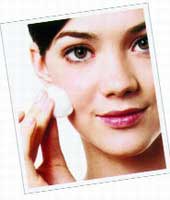 The best way to protect your skin during dry seasons is to incorporate foods rich in vitamins and micronutrients. Milk, meat, liver, fish, fruits, and vegetables are some of the best sources of vitamins and nutrients for the skin.
The best way to protect your skin during dry seasons is to incorporate foods rich in vitamins and micronutrients. Milk, meat, liver, fish, fruits, and vegetables are some of the best sources of vitamins and nutrients for the skin.
The skin on the face is always thinner than on other areas, and during cold, dry weather (with low humidity), it is normal for the skin to crack. Cold weather causes peripheral blood vessels to constrict, leading to insufficient blood flow to fingers, toes, nose, and eyes, which can result in a tingling sensation. There is no need to avoid washing your face with warm water; on the contrary, warm water increases blood flow to areas that are lacking, thereby nourishing the skin better. There are many types of skincare creams available on the market, but some do not retain moisture for long. Therefore, it is necessary to use a good quality moisturizer and apply it multiple times a day if you are prone to cracking.
Using skincare cream alone is not enough; you also need to nourish your skin with a diet rich in vitamins and micronutrients. Everyday foods contain these essential components; you just need to choose wisely. For example, the following foods can help achieve beautiful skin:
-
Vitamin B2: Protects skin tissues and the epidermis, rarely deficient as it is found in many foods (milk, cheese, peas, cereals, dried fruits, mushrooms, potatoes, meat, fish…). A deficiency can cause damage to the skin and lips (angular cheilitis).
-
Vitamin B6: Prevents the overproduction of sebum in oily skin. A deficiency can lead to excess sebum and acne (found in egg yolks, meat, liver, fish, bananas, vegetables…);
-
Vitamin B9: Aids in the rapid regeneration of skin and mucosal cells. A deficiency can cause pale skin as it is involved in the formation of red and white blood cells (found in liver, tuna, bananas, various vegetables);
-
Vitamin A: Protects the epidermis and promotes quick healing of scars. A deficiency will cause the skin to become dry and thick (found in avocados, milk, egg yolks, vegetables);
-
Vitamin C: Helps cells regenerate quickly, leading to faster healing of scars. A deficiency will result in dull, less vibrant skin (found in many fruits and vegetables consumed daily).
-
Vitamin E: Acts as an antioxidant, keeping the skin youthful and helping to protect it from sun damage. It is rarely deficient; a deficiency can lead to premature wrinkling (found in vegetable oils, soybeans, avocados, liver…);
-
Vitamin F: Maintains balance and protects the skin; a deficiency can cause thickening and increased susceptibility to damage (found in vegetable oils, fish).
Zinc, iron, and selenium are essential micronutrients: A deficiency can lead to small pimples or pale skin or accelerated aging (found in many foods such as fish, meat, dairy, eggs, and red beans…).
Social Family


















































